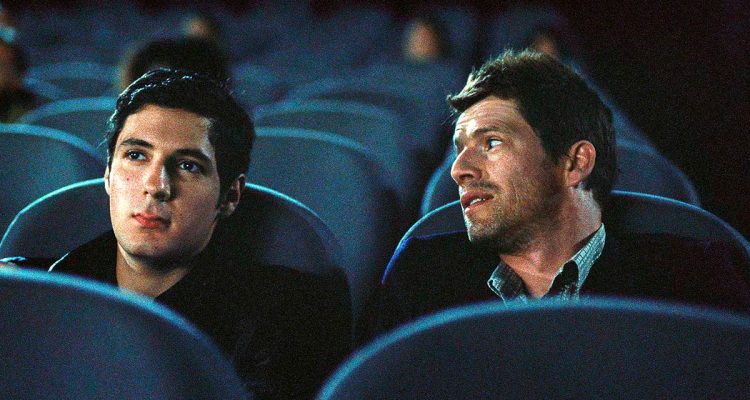Equal parts “Weekend” and “120 BPM” – while still being a pure product of writer-director Christophe Honoré – “Sorry Angel” is a tender, tentative romance, simultaneously full of both life and death. Set in 1993 in France, AIDS casts a dark shadow over the relationship between two men who can’t stay away from each other, despite the distance that divides them and the diagnosis of the elder one.
READ MORE: New York Film Festival: 15 Must-See Films To Watch
“Sorry Angel” starts off with a fevered flash, with its throbbing opening titles set to Massive Attack‘s sultry “One Love.” But from there, Honoré’s drama slows down, meandering through the lives of its two central characters. In Paris, 30-something writer Jacques (Pierre Deladonchamps) amicably shares custody of his son, Louis (Tristan Farge) with Nadine (Adèle Wismes), and he depends on his easy, close friendship with his enjoyably grumpy neighbor Mathieu (Denis Podalydès). While traveling to Rennes, he meets young Breton film student Arthur (Vincent Lacoste) in a showing of “The Piano,” where they chat and flirt through the movie, at once revealing themselves as people I’d hate and characters I’m already growing to like.
READ MORE: 56 Must-See Films: The 2018 Fall Movie Preview
Arthur is disarmingly sweet, and he falls fast and hard for Jacques. The older author is more hesitant to fully commit to a real romance, partially out of years of experience in life and love and partially due to his AIDS diagnosis. Back in Paris, his friend and ex-lover Marco (Thomas Gonzalez) flits in and out of his life, struggling with the illness that’s in its advanced stages himself. Over months, Jacques and Arthur sporadically meet, staying in each others’ thoughts and hearts, while they go about their divergent lives.
Honoré was a novelist before he became a filmmaker, and his roots are clearly visible throughout the film. It isn’t just Jacques’ profession as a writer or even the frequent references to gay literary icons from Walt Whitman to Christopher Isherwood. Instead, the film itself feels more like a novel than most movies do, both to its credit and its detriment. It isn’t insistent on a traditional plot structure or the need for momentum. “Sorry Angel” really takes its time with its characters, which may frustrate some viewers who want to have a sense earlier on of what they’re actually getting into. This wouldn’t be a page-turner; it would be the kind of book you savor, cracking open when you’re in the place to really live within its world.
Despite its setting in 1993, this isn’t a warmly nostalgic look at life in the ’90s. “Sorry Angel” is very much about a time, a place and a feeling, but it still feels vital. While AIDS plays a large role in the film, it isn’t the defining characteristic of Jacques, and he doesn’t let it rule every moment of his life. Despite moments of sadness and loss, Honore’s drama isn’t a dour dwelling on past pain. There are moments of joy and humor throughout, and the film insists on feeling those emotions, just as much as it does grief.
Honoré is still Honoré, the same filmmaker who made “Love Songs” and “Dans Paris,” but the intervening years and half-dozen films have created a more mature filmmaker. He’s still wildly romantic, as largely seen through Arthur’s character here, but there’s a welcome sense of restraint. This is quieter and more subdued work than most viewers will expect from him, but it’s ultimately more rewarding as well. [B+]
Check out all our coverage from the 2018 New York Film Festival here.

